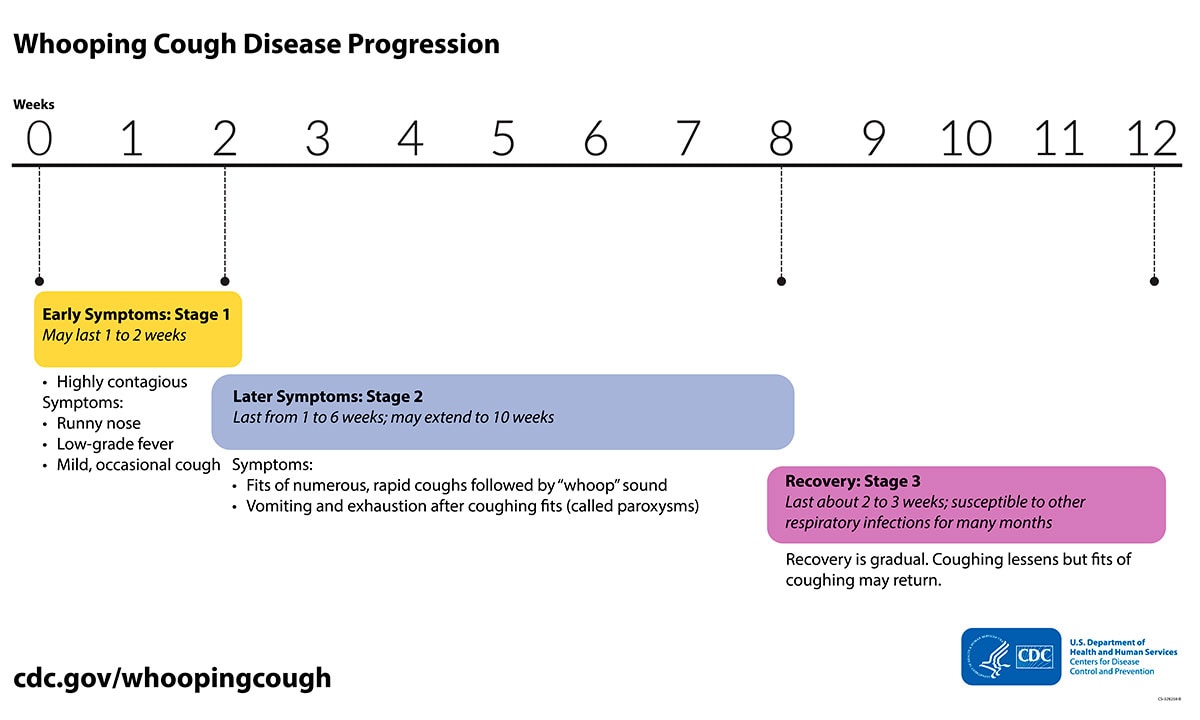Key points
- Early symptoms of pertussis (whooping cough) can look like a common cold.
- Whooping cough is known for the "whoop" noise when someone gasps for air after a coughing fit.
- Babies and young children may not cough but may have difficulty breathing instead.

Early symptoms
It usually takes 5 to 10 days for symptoms to appear after exposure to the bacteria that cause whooping cough. Sometimes symptoms don't develop for as long as 3 weeks.
Appears like a common cold
Whooping cough appears similar to a common cold early on. Healthcare providers often don't suspect or diagnose it until more severe symptoms appear.
Early symptoms can last for 1 to 2 weeks and usually include:
- Runny or stuffed-up nose
- Low-grade fever (less than 100.4°F)
- Mild, occasional cough
Babies may struggle to breathe
Many babies with whooping cough don't cough at all. Instead, they may have apnea (life-threatening pauses in breathing). The apnea may cause cyanosis (to turn blue) or they may struggle to breathe.
For some babies, whooping cough may seem like a common cold for the entire illness, not just at the beginning.
Later symptoms
Rapid, violent, and uncontrolled coughing fits
One to 2 weeks after the first symptoms start, people may develop paroxysms, known as coughing fits. These coughing fits usually last 1 to 6 weeks but can last for up to 10 weeks. The cough generally gets worse and becomes more common as the illness continues.
Coughing fits can cause people to
- Make a high-pitched "whoop" when they inhale after a coughing fit
- Vomit during or after coughing fits
- Feel very tired after the fit, but usually seem well in-between fits
- Have difficulty sleeping at night
- Struggle to breathe
- Fracture (break) a rib
Those who get these coughing fits say it's the worst cough of their lives.
Contact a healthcare provider
Vaccinated people may not get as sick
Whooping cough vaccines work but aren't perfect. For people who've been vaccinated but still get whooping cough, their illness is generally milder.
Recovery
Recovery can be slow with the cough becoming milder and less common over time.
Coughing fits may stop for a while but can return with other respiratory infections. Coughing fits can return many months after the whooping cough illness started.

Complications
Babies and children
Whooping cough can cause serious and sometimes deadly complications in babies and young children. Babies and children who haven't had all recommended whooping cough vaccines are more likely to get serious complications.
Serious complications are common
About 1 in 3 babies younger than 1 year old who get whooping cough need care in the hospital. The younger the baby, the more likely they'll need hospital treatment.
Babies younger than 1 year old who are treated in the hospital can have:
- Apnea: 2 in 3 (68%)
- Pneumonia (lung infection): 1 in 5 (22%)
- Convulsions (violent, uncontrolled shaking): 1 in 50 (2%)
- Encephalopathy (disease of the brain): 1 in 150 (0.6%)
One in 100 (1%) will die from their complications.
Teens and adults
Teens and adults can also get complications, like pneumonia, from whooping cough. Complications are usually less serious in this older age group, especially in those who have been vaccinated against whooping cough.
However, if complications are serious, some people may need care in the hospital.
